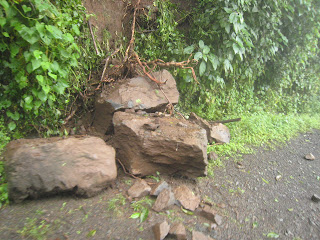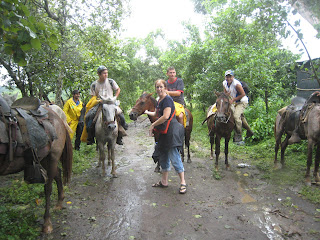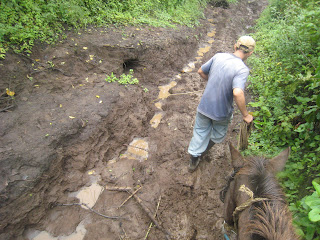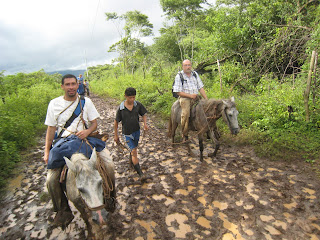I woke up this morning feeling cold. I didn’t want to get out of bed and I knew it was drizzling outside. After wallowing in self-pity for a few moments I mentally smacked myself in face. I felt selfish. There are so many more people in El Salvador in much, much worse conditions than I. Compared to most, I live in a palace. And today especially. Today the Pastoral Team and the delegation were going to try to make their way to the community of Río de los Bueyes, which is close to the Lempa River and has been badly flooded. We were going to be delivering food packets to all the families.
This morning several different food items were delivered to the Pastoral House and we all began assembling the food into packets. In each packet was 2 pounds of beans, 4 pounds of rice, 4 pounds of sugar, 4 packages of spaghetti, 4 soup packages, 1 pound of coffee, cheese, and oil. We got ourselves somewhat organized, each person with their own job, and started to assemble the packets. We made 68 packets with each packet weighing about 15 pounds for a total of 1020 pounds. With all of us working together we got them assembled quickly. Antonio and Raul from El Tablón brought their truck to drive and haul the packets. We loaded up and soon we were off.
Bagging beans
Helping out
Bagging rice
Putting together packets
Teamwork
Tying the bags
As we were getting close to the last house in San Isidro the truck got stuck in the mud. Everybody got off the truck so Raul could try to maneuver out of the mud. But it didn’t work. Thankfully Pedro had brought some rope along, and I’m sure Raul had some in the truck as well. So they tied the rope to the front of the truck and several of the guys pulled the truck as Raul steered out of the mud. Everyone applauded when they’d gotten out. We drove a little further and then parked the truck.
Police asking us questions
Passing a landslide
Road partly washed away
Small landslide
Rocks in the road
Another small landslide
Driving by fields
Pulling the truck out of the mud
When we arrived at the last house we were met by several young men on horses who’d ridden up from Río de los Bueyes to meet us. And thank goodness they did! We had 1000 pounds worth of food to carry down and that would have been a lot if we didn’t have the horses. Earlier in the day I had joked that I was going to be met by a horse and I would be escorted down the hill. So when we saw the horses I was shocked. Going at a steady pace it takes about an hour to climb the mountain up to San Isidro from Río de los Bueyes on horseback. What a nice group of guys! Many of them were wearing boots and raincoats since it was muddy and rainy down there and on the ride up. I was truly impressed.
Everyone was smiling as we unloaded packets from the truck. The guys put the packets into large bags, tied them up, and put them up on the horses. With everyone working together things got done quickly. When we’d finished the guys who’d come up offered us a ride down on the horses. This was also a big surprise. A couple of us got on horses to ride down while others decided to walk. I’d been looking forward to the walk down the mountain in the mud. When I was a little kid I used to go creek walking at camp or create muddy areas at the house to slosh around in and I never quite grew out of that. But I also really love horseback riding and it’d been a couple years since I last was on a horse so I opted to ride.
One of the guys had a beautiful, big female horse and offered me a ride. I put my foot in the saddle and threw my other leg over. I used to go horseback riding in the mountains of Arizona with my dad when I was young so this brought back memories. Marie, Teri, Kathy, and Mauricio also hopped up on horses. Weldon, Lisa, Cecilia, Blanca, Idalia, Elmer, and Jesús decided they’d walk down. Bravo!!! The ladies have a fear of horses which is why they choose not to ride. But Lisa and Weldon wanted the experience of walking.
In spite of the situation I found myself excited. I was glad we had the opportunity to go visit the community and I was elated that all these guys had met us with their horses. The community was working together to fight against the rain, flooding, and landslides that threatened their homes and their lives. The Pastoral Team and delegation was willing and wanting to spend their time making packets and delivering them to the community. That kind of teamwork and dedication to community and to humanity always makes me feel joyful.
You see, we were the first group of people to visit the community of Río de los Bueyes since all this rain started. No non-governmental organizations (NGOs) had been down to visit the community. The community had petitioned the Berlín City Hall for help but received nothing. No one from City Hall had even been down to the community to see how the people were doing. So not only were the food packets that we were bringing appreciated, but also the fact that we wanted to go down to the community to see the people was important. Solidarity and caring are vital to helping people in these kinds of situations.
Kathy greeting the horses
Putting packets into bags
Loading up sacks
Lots of bags
Putting the boxes of oil into sacks
Teamwork
This poor guy only had shorts and flipflops
Unloading from the truck
Checking out the horses
Finally finished
Marie is lookin' good
I love riding horses!
It was a muddy path down the mountain. I started to feel really guilty for being up on the horse while Carlos was walking in the mud. I knew the conditions he’d been living in recently were worse than a few weeks ago, which isn’t saying much since most of the people in the cantons don’t have really high standards of living. And even though the horse I was on was bigger and looked healthy compared to many horses here in El Salvador, I knew she must be tired as well. When it started raining a little harder I was glad all I had on were pants and a tank top. I figured it’d do me some good to be cold and wet. It was a good reminder of how lucky I am.
We came to a part of the road where I could see the Lempa River. I could see how far out of the banks it was and all the trees that were under water. I knew there were several homes and roads in the places I was seeing that were under water as well. I couldn’t believe how far out the water had come. And Carlos told me that the day before it was out twice as far as it was now. I also knew there were a lot of sugarcane fields under water. I asked him how sugar cane did in flood conditions. He said it depended, but for the most part a lot of the sugar cane would probably be okay. It’s pretty resistant when it comes to water, which is why is thrives best in the lowlands where water sitting in the fields is more common. I hope the sugarcane is okay. I hope no more rain falls.
Here comes Teri
Kathy got this pic of all the guys in their raincoats
Her horse "driver" tried to help this little fallen horse
Passing fields
Carlos was trying not to step in the watery parts
But they're hard to avoid
Lots of mud
Human and horse tracks
First sighting of the flooding Lempa River
Way in the back is where the river is supposed to be
An awful sight
Totally flooded
An hour after we’d started we reached the school in Río de los Bueyes. It was a 2-3 mile walk downhill. We were the first ones to arrive and much further ahead because Carlos had really walked fast down the mountain. I greeted the people who were waiting by the school when we arrived. I joked around with some of the little kids and talked with a few of the women about how they’d been doing with all the water. A majority of the families had been moved to the school recently because the flood water had reached their homes. But they were able to go back today because the waters had receded.
Little by little everyone else arrived at the school. The last batch of riders and walkers arrived about a ½ hour after I did. The people walking were covered in mud. I learned that Weldon fell down twice and both he and Lisa had blisters on their feet from the walking. They said their feet kept slipping around in the mud but also inside their own shoes. I can only imagine what the walk must have been like. But kudos to them for walking all the way!
All the bags were carried into the school area and set on the tiled floors just outside the classroom. The oil was taken out of the separate bags it had been put in and one bag was placed in each food packet. These kinds of staple foods that people were getting were important not only because some of them lost their food they had in the flooding, but also because they had lost crops and lost work. Not only that, the little stores in the area that carry food had run out because it is very difficult to make it to Berlín to buy more food. On foot, in these conditions, it takes 4-5 hours to reach Berlín from Río de los Bueyes or 2½ hours by horse. And the main roads that people normally take where they often catch a ride from local transport were completely flooded.
As soon as all the packets had been unloaded and had oil added to them the president of the Directiva had everyone gather around. He began by thanking the Pastoral Team and the delegation for putting together the food packets and bringing them to the community. He said that they were pleased for the food packets as well as the delegation’s willingness to come to the community to see how people were doing. He also thanked the Pastoral Team for always keeping an eye on the community and remembering them during this difficult time. Blanca also spoke briefly to the community about the visit.
Then it was time to start handing out the packets. Since this community doesn’t have a partnership with an Iowa church nor does the Pastoral Team have a census of the community, the Directiva had put together a list of names of someone from each family in the community. They called someone from each family up to the front to sign or put their fingerprint on the paper for their packet. The Directiva took advantage of this time by also having the families write down the names of their children so the Directiva could have a more accurate census.
In Rio de los Bueyes at the school
Waiting for others to arrive
Here they come
The walking group
Putting oil in the packets
Getting things organized
The president of the Directiva talking, Pedro translating
Blanca talking to the group
Listening to everyone
Families waiting
Receiving packets
A thumb print instead of a signature
By then it was about 1:30pm. We hadn’t had lunch and (thankfully) no one in the community made anything. Right now the people really cannot afford nor do they have the resources to be feeding a group of people. Besides, the Team had brought crackers, bread, and pop for us to eat which was more than sufficient. So we went to a little area off to the side to eat. When we’d finished we watched the people receiving their packets. Everyone was very thankful and said as much.
When it was about 2:00pm they were finished up with the packets and we prepared for the trip back up the mountain. I figured we’d be walking back up which probably would have taken us gringos close to 2 hours. But the guys with the horses returned, telling us they’d take us all back on horses. Cecilia and Jesús did not want to go on horseback and started walking back up the hill right away. But everyone else got on the horses. It was Idalia and Blanca’s first time riding on a horse. They were both a little scared and had difficult time getting up on the horses but eventually made it up there.
The SUN came out a little bit as we started to make our way back up the hill and I could even see some BLUE SKY which I hadn’t seen in over a week. This time I was closer to everyone else so I was able to chat with everybody as we rode. It took a little over an hour to ride back up the mountain. When we arrived we hopped off and profusely thanked all the guys that had spent their time and energy carrying the packets and us to the community and back. The horses also did a lot of walking: up and down and up and down. After saying goodbye we got back in the truck and headed to Berlín. I’m glad we made the trip.
Kathy stepped in mud
Idalia trying to mount the horse
Blance used the little wall at the school to get up
Peace!
Here come Weldon and Marie
It's blue sky!
Idalia is doing well
Hola Lisa
Here they come
Along we ride
Part of the road had fallen away
There's Elmer
We've made it back
Kathy got this great pic of Manuel
Corn and beans with the river in the background
Driving back to Berlin
Hopefully the fields aren't too damaged



































































2 comments:
I'm sure the pictures do not adequately tell the story of all the mud and rain, Alisha.
What a trip. I'm so glad you were able to get to Río de los Bueyes. I'm sure the food packets really helped the people a lot. I'm glad you got to ride a horse for a while, I know how much you enjoy that.
Post a Comment